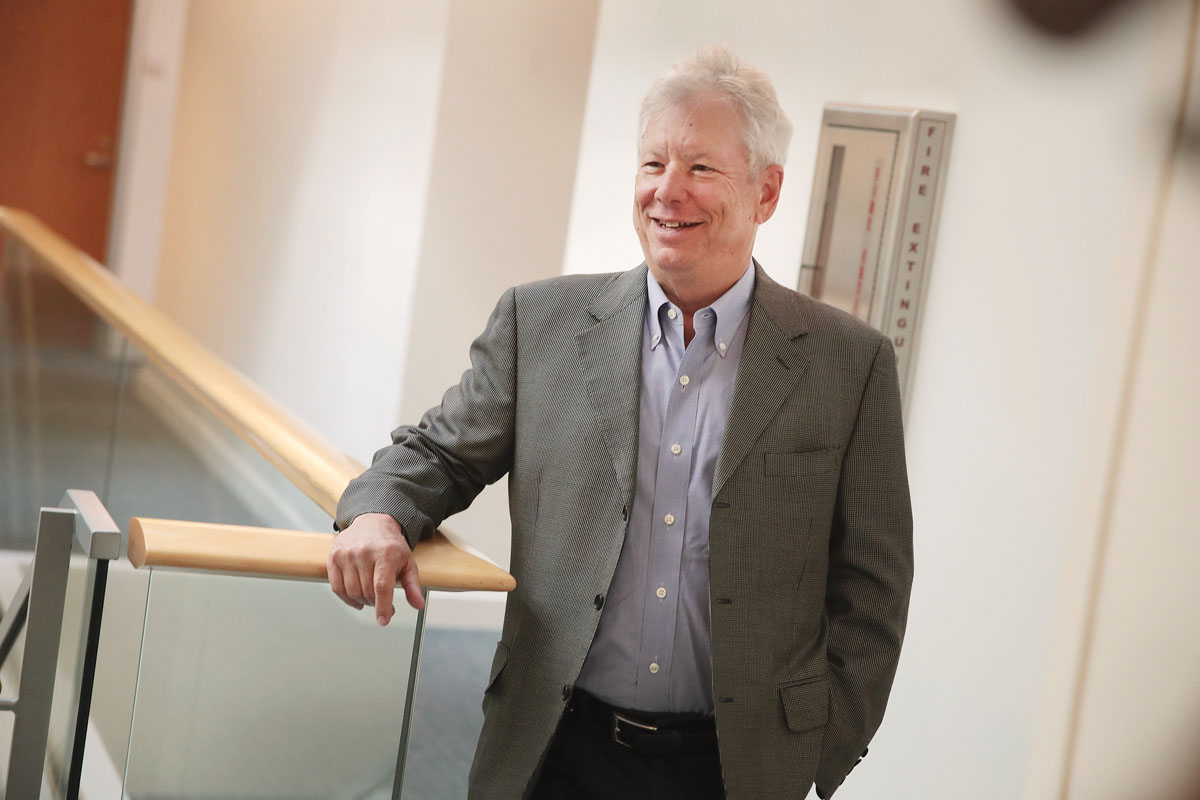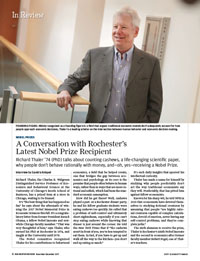In Review
 FOUNDING FIGURE: Widely recognized as a founding figure in a field that argues traditional economic models don’t adequately account for how people approach economic decisions, Thaler is a leading scholar on the intersection between human behavior and economic decision making. (Photo: Scott Olson/Getty Images)
FOUNDING FIGURE: Widely recognized as a founding figure in a field that argues traditional economic models don’t adequately account for how people approach economic decisions, Thaler is a leading scholar on the intersection between human behavior and economic decision making. (Photo: Scott Olson/Getty Images)Richard Thaler, the Charles R. Walgreen Distinguished Service Professor of Economics and Behavioral Science at the University of Chicago’s Booth School of Business, has a prized item at a store in Chicago, waiting to be framed.
Special University Guest
The University awarded Thaler an honoray degree during commencement ceremonies in 2010. He also was a panelist for a conversation on the “The Future of Financial Regulation” during Meliora Weekend in 2009. As part of that year’s Presidential Symposium, he was joined by then SEC chair Mary Shapiro, then Goldman Sachs managing director E. Gerald Corrigan, and former SEC chair Richard Breeden. The conversation was moderated by University Trustee Hugo Sonnenschein ’61.
It’s “the best thing that has happened so far,” he says about the aftermath of winning the 2017 Nobel Memorial Prize in Economic Sciences this fall. It’s a congratulatory letter from former President Barack Obama, a fellow Nobel laureate and erstwhile Chicago faculty member. “That was very thoughtful of him,” says Thaler, who earned his PhD at Rochester in 1974, and taught at the University until 1978.
The Nobel committee recognized Thaler for his contributions to behavioral economics, a field that he helped create, one that bridges the gap between economics and psychology. At its core is the premise that people often behave in human ways, rather than in ways that are more rational and selfish, which had been the standard economic assumption.
Rochester’s Nobel Laureates
Economist Richard Thaler ’74 (PhD) became Rochester’s ninth Nobel Prize recipient this fall, when he was recognized for his work in behavioral economics. He joins five other graduates and three faculty members among the University’s Nobel laureates.
2002 Nobel Prize in Physics
Physicist Masatoshi Koshiba ’55 (PhD), who led work to detect the subatomic particles known as neutrinos.
1997 Nobel Prize in Physics
Physicist Steven Chu ’70, former Secretary of Energy, who developed methods to cool and trap atoms with laser light.
1993 Nobel Prize in Economic Sciences
Economist Robert Fogel, a former faculty member who pioneered quantitative analyses of social history.
1976 Nobel Prize in Physiology or Medicine
Carleton Gajdusek ’43, who is credited with discovering the infectious disease mechanism of prions.
1959 Nobel Prize in Physiology or Medicine
Arthur Kornberg ’41M (MD), who first discovered a way to synthesize DNA.
1955 Nobel Prize in Chemistry
Vincent du Vigneaud ’27 (PhD), a biochemist, for research on sulfur-containing compounds.
1943 Nobel Prize in Physiology or Medicine
Biochemist Henrick Dam for his discovery of vitamin K.
1934 Nobel Prize in Physiology or Medicine
George Whipple, founding dean of the School of Medicine and Dentistry, for his work to develop a therapy for anemia.
How did he get there? Well, cashews played a part. At a Rochester dinner party, he and his fellow graduate students were eating cashews too quickly. He called that a problem of self-control and ultimately short-sightedness, especially if you can’t stop eating cashews while knowing that dinner is just around the corner. He told the New York Times that if “the cashews aren’t in front of you, you’re less tempted to eat them. In fact, if you have to get up and walk all the way to the kitchen—you don’t end up eating so much.”
It’s such daily insights that spurred his intellectual curiosity.
Thaler has made a name for himself by studying why people predictably don’t act the way traditional economists say they will. Predictably, that has pitted him against fellow economists.
Known for his sharp wit, he told NPR in 2015 that economists have devoted themselves to studying fictional creatures by assuming that people “are highly rational creatures capable of complex calculations, devoid of emotion, never having any self-control problems, and they’re complete jerks.”
The sixth alumnus to receive the prize, Thaler is Rochester’s ninth Nobel laureate and the second in economics after former faculty member Robert Fogel, one of Thaler’s teachers.
You’ve said that for the last 50 or 60 years, economists have devoted themselves to studying fictional creatures. “They might as well be studying unicorns,” you said. That must have really endeared you to fellow economists.
Yes, it did not go over well at the Simon School where I was teaching, so I had to leave Rochester for Cornell. I told people I was moving south for the weather.
Where was that “gigantic house in Rochester” where you left the cashews in the kitchen so as to reduce your and your fellow graduate students’ consumption?
It was certainly not a gigantic house. Probably graduate student housing. Later I lived on Stanford Road near the hospital.
Do you have more friends in the field now that you won the Nobel Prize?
No, but I have heard from many old friends, even some from childhood. That has been great fun. But the best thing that has happened so far is getting a personal note from President Obama. That was very thoughtful of him.
You joked that you would spend the 9 million Swedish krona prize money as irrationally as possible and called it “fun money.” Have you started? On what?
Well, I haven’t gotten the money yet, so according to behavioral economics I will not start splurging until I get the money. I have bought plane tickets for my kids and their spouses to join the festivities in Stockholm, but that is highly rational.
What were you obsessed with in Rochester when you worked on your PhD here? Besides cashews and garbage plates—intellectually, I mean?
My PhD thesis, supervised by Sherwin Rosen [the late Rochester labor economist], was on the value of a human life. It was a very standard economic exercise, estimating how much you had to pay people to take risky jobs, but I did ask some questions that piqued my interest. I asked people how much they would pay to eliminate a 1/1000th risk of death and how much they would have to be paid to accept an increased risk of death of 1/1000th. The answers differed wildly, often by several orders of magnitude. Standard economic theory said they should be about the same. That got me thinking deviant thoughts.
During that time you read a paper that had just been published by psychologists Daniel Kahneman and Amos Tversky—“Judgment under Uncertainty: Heuristics and Biases.” This one paper altered the course of your work, your life . . . how?
They had one key idea that made my research possible, namely that people made predictable errors in judgments.
Economists were happy to admit that people made mistakes but they thought the mistakes would just wash out and add random noise. The idea of systematic bias was fundamental.
You came up with the idea of sunk costs because of a snow storm in Buffalo . . .
Economists are always telling people to ignore “sunk costs,” that is, money that has already been spent. They also assume that people naturally behave as if they understood this concept, even though they have trouble teaching it to students.
The story you are referring to was this: a friend and I were given two tickets to an NBA game in Buffalo back when they had a team. There was a big snow storm so we didn’t go, but my non-economist friend said, “If we had paid for those tickets we would have gone for sure.” I thought, “Hmmm, another item for my list of funny behavior.”
May we call you the father of behavioral economics? When did you realize that you were on to something that would either shake up your field or make you a total outcast?
Some have called me that, though the field has many creators. And yes, it did make me an outcast in some places, including Rochester. I think that will still be the case now at the Simon School.
In your latest book Misbehaving: The Making of Behavioral Economics (W. W. Norton, 2016), you tell stories of things that people do that don’t make sense in traditional economic theory. Is most of the traditional theory rubbish?
No, economic theory is not rubbish. In fact, it is essential to what I do. But economic theory is about how people “should” behave if they want to be rational. We need that theory, but we also need other theories to say how people actually behave.
In return, a colleague accused you in 2004 of being a “paternalist”—have you made peace with that title? Or is “professional nudge” better?
My colleague and I call it libertarian paternalism because it is true that we are trying to help people (the paternalistic part), but we try to do so without requiring anyone to do anything (the libertarian part). That is what our book Nudge [written with Harvard Law School Professor Cass Sunstein] is about.
Have you finished writing your acceptance speech for the Swedish Academy? Want to give us a preview sentence or two? Will the word “enhörning” (Swedish for unicorn) come up?
No, haven’t started. Too busy answering interviews like this one. Now back to work!

